
Out Run is an arcade driving video game released by Sega in September 1986. It is known for its pioneering hardware and graphics, nonlinear gameplay, a selectable soundtrack with music composed by Hiroshi Kawaguchi, and the hydraulic motion simulator deluxe arcade cabinet. The goal is to avoid traffic and reach one of five destinations.
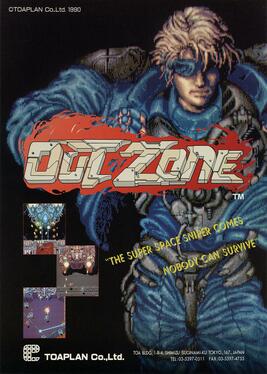
Out Zone is a run and gun arcade video game developed by Toaplan and published in Japan by Tecmo, North America by Romstar and Europe in August 1990. Set in a future where an alien race from the fictional planet Owagira are threatening to wipe out humanity after multiple failed attempts to defend Earth against their attacks, players assume the role of cyborg mercenaries recruited by the United Nations in a last-ditch effort to overthrow the invaders.
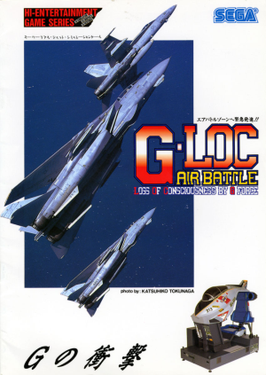
G-LOC: Air Battle is a 1990 combat flight simulator arcade video game developed and published by Sega. It is a spin-off of the company's After Burner series. The title refers to "G-force induced Loss Of Consciousness". The game is known for its use of the R360 motion simulator arcade cabinet. The arcade game was a commercial and critical success upon release.

WWF WrestleFest is a professional wrestling video game developed and released by Technōs Japan for arcades in 1991, featuring stars of the World Wrestling Federation (WWF). The game was distributed by Technōs in Japan and North America, and by Tecmo in Japan, Europe and Australasia. It is the sequel to Technōs' previous WWF game, WWF Superstars. Compared to Superstars, WrestleFest adds a variety of different wrestlers to the roster as well as enhanced graphics and sound. There are more voice samples, including commentary and pre-match introductions by WWF ring announcer Mike McGuirk. The voiced cut scenes featuring Gene Okerlund from Superstars returned as well.

Parodius! From Myth to Laughter, released in Japan as Parodius Da! Shinwa kara Owarai e and outside Japan as Parodius, is a shoot 'em up arcade video game and the second title in the Parodius series produced by Konami. The European SNES, Sega Saturn and PlayStation versions are also known as Parodius: Non-Sense Fantasy. The gameplay is stylistically very similar to the Gradius series, but the graphics and music are intentionally absurd.

Mercs, originally released as Senjō no Ōkami II in Japan, is a run and gun video game developed and published in arcades by Capcom in 1990. It is a sequel to the 1985 arcade video game Commando. While not as successful as its predecessor, Mercs was well received by critics and was a moderate commercial success. It was followed by Wolf of the Battlefield: Commando 3 in 2008, a downloadable game.

Alien Crush is a pinball video game developed by Compile for the PC Engine/TurboGrafx-16. It was released in 1988. The game is the first installment in the Crush Pinball series. It was followed by three sequels, Devil's Crush, Jaki Crush, and Alien Crush Returns. Alien Crush was later re-released via emulation on the Virtual Console for Wii, 3DS, and Wii U, and for PlayStation 3 through PlayStation Network.

GP Rider is a motorcycle racing game developed and manufactured by Sega, released in as an arcade video game in Japan, North America and Europe. It came in a two-player motion simulator cabinet and a standard upright cabinet. It was ported to the Master System in 1993 and then Game Gear in 1994.

Steel Talons is a 3D combat flight simulator arcade game released by Atari Games in 1991. The player takes on the role of a pilot for an "AT1196 Steel Talons combat helicopter". Steel Talons was ported to the Sega Genesis, Atari Lynx, Atari Falcon, and the Super Nintendo Entertainment System. A Jaguar port was announced, but never released.
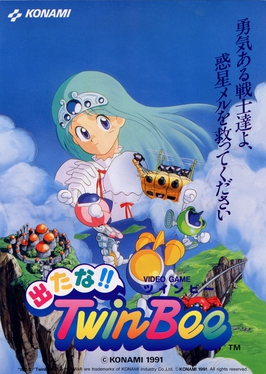
Detana!! TwinBee, released in Europe and North America as Bells & Whistles, is a 1991 vertically scrolling shooter arcade video game developed and released by Konami. It is the fifth entry in the TwinBee series and the second to be released for arcades following the original TwinBee. Set several years after the events of TwinBee, players assume the role of Light and Pastel taking control of TwinBee and WinBee to defeat invading forces of the evil alien Iva and save planet Meru after receiving an SOS message sent by Princess Melora.

Xexex, released as Orius in North America, is a 1991 side-scrolling shoot 'em up arcade game by Konami. It draws on Irem's R-Type and Konami's other shoot 'em up Gradius, while adding the tentacle mechanics of Irem's other shoot 'em up XMultiply. In the game, players take control of the Flintlock space fighter in a mission to rescue Princess Irene La Tias of Planet E-Square, who has been captured by the evil galactic warlord Klaus Pachelbel.
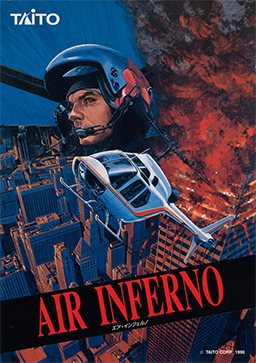
Air Inferno is a 1990 flight simulation arcade video game developed and released by Taito, in Japan, Europe and North America. A spin-off from Taito's Landing series, Air Inferno is an aerial firefighting simulation that involves piloting a helicopter on various rescue missions, shooting a fire extinguisher to extinguish flames while rescuing civilians.

Slap Fight is a 1986 vertically scrolling shooter arcade video game developed by Toaplan and published by Taito. Set on the colonized fictional planet of Theron in the future, where an alien race led by Gaudy have invaded the human-controlled location, players assume the role of an Allied League of Cosmic Nations (ALCON) fighter pilot taking control of the SW475 space fighter craft in an effort to counterattack the invaders. Initially launched for the arcades, the game was later ported to other microcomputer and console platforms by various third-party developers, with each one featuring several changes or additions compared to the original release.

Two Crude, released in Asia as Crude Buster, is a 1990 beat 'em up arcade game developed and published by Data East. It was a follow-up to Bad Dudes Vs. DragonNinja (1988). The game was later ported to the Mega Drive/Genesis in 1992. Outside Japan, the port was released under the name Two Crude Dudes.

Hammerin' Harry, known in Japan as Daiku no Gen-san, is a series of platforming video games developed and published by Irem in 1990. The titles were developed and published for the arcades, Famicom, Game Boy, Super Famicom and Sony PSP platforms. The series is centered around the titular Harry, a hammer-wielding carpenter who protects his hometown of Beranme from the corrupt construction companies that mean to tear it down.

Gaiapolis is a 1993 action role-playing beat 'em up arcade game developed and published by Konami. Taking place in a fantasy world, the game follows prince Gerard Himerce, joined by the half-human fairy Elaine Shee and the exiled dragon duke Galahad, seeking vengeance for destruction of his homeland against the Zar Harc empire led by the King of Darkness and prevent him from resurrecting an ancient demon. Through the journey, players explore and search for items to progress and power-ups, fighting enemies and bosses, and gaining experience points to increase their character's maximum health and level.

Teenage Mutant Ninja Turtles, released in Japan as Teenage Mutant Ninja Turtles: Super Kame Ninja and in Europe as Teenage Mutant Hero Turtles, is a 1989 beat 'em up game developed and published by Konami for arcades. It is based on the Teenage Mutant Ninja Turtles franchise, including the first animated series that began airing two years earlier. In the game, up to four players control the titular Ninja Turtles, fighting through various levels to defeat the turtles' enemies, including the Shredder, Krang and the Foot Clan. Released during a high point in popularity for the Teenage Mutant Ninja Turtles franchise, the arcade game was a worldwide hit, becoming the highest-grossing dedicated arcade game of 1990 in the United States and Konami's highest-grossing arcade game. Versions for various home systems soon followed, including the Nintendo Entertainment System. A sequel, Teenage Mutant Ninja Turtles: Turtles in Time, was released in 1991.
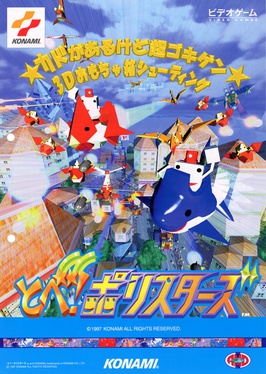
Tobe! Polystars is a scrolling shooter arcade video game developed and originally published by Konami in March 1997. It has not received any official port to home consoles after its arcade release. It is the first game that ran on the Konami M2 hardware, which was Konami's version of the Panasonic M2. Taking place on the fictional planet Polygon, where the secret Perfect Primitive Polygon association led by Material the Third have invaded its inhabitants, players assume the role of police officers Poly and Stan from the titular squad in order to restore peace on their home.

Prehistoric Isle is a 1989 scrolling shooter arcade video game originally developed and published by SNK. Set during the 1930s, where ships at The Bahamas mysteriously disappeared, players assume the role of U.S. Marine pilots taking control of biplanes in a reconnaissance assignment at "Greenhell Isle", a fictional island inhabited by dinosaurs and creatures thought to be extinct. Headed by a director under the pseudonym of "Yah!", the game was developed by most of the same team that would later work on several projects for the Neo Geo platforms at SNK. First launched in arcades, the title has since been re-released through download services and compilations for various consoles. It received positive reception since its initial arcade release from critics who praised the visuals, sound design, gameplay and originality. A sequel, Prehistoric Isle 2, was released in 1999 for the Neo Geo MVS but garnered less success than its predecessor.




















